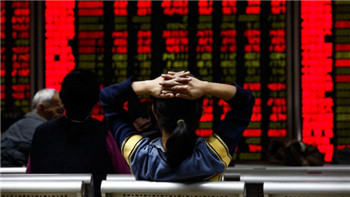(单词翻译:单击)

Once again, financial markets are painting an oversimplified picture of a very complex story. China is being blamed for everything from the recent rout in global equity markets to the next recession.
再一次,金融市场描绘出一幅过于简单化的画面,用来讲述一个非常复杂的故事。从最近的全球股市下跌,到下一轮可能发生的衰退,中国被认为是导致各种问题的原因。
While China’s scale and cross-border connectivity are not to be minimised, its global impacts are far more subtle. At work is a tug-of-war between two powerful forces: the country’s long telegraphed transition to a new growth model and the necessary development of a robust financial infrastructure.
不能低估中国的规模及其跨境关联性,但其全球影响却微弱得多。在起作用的是两大因素的“拉锯”:中国长期宣称的朝着新增长模式的转变;健全的金融基础设施的必需建设。
Contrary to widespread opinion, China is making reasonably good progress on the first count, especially in shifting the structure of its economy from manufacturing to services. These shifts are far more important than the inordinate fixation on headline gross domestic product. A misplaced obsession with the statistical accuracy of total growth misses this crucial point as well.
与普遍看法相反,中国在第一方面正在取得相当良好的进展,尤其是在推动经济结构从以制造业为中心转向以服务业为中心方面。这些转变比人们过度执迷的总体GDP数字重要得多。过分在意总体增长的统计准确性也会忽视这个关键点。
The demise of the commodity supercycle is a tougher repercussion. Momentum-driven investors — as well as resource economies such as Brazil, Russia, Australia and Canada — were slow to see the significance of China’s shift from commodity-intensive growth.
大宗商品“超级周期”终结的后果更严重。动量驱动型(momentum-driven)投资者——以及巴西、俄罗斯、澳大利亚和加拿大等资源型经济体——未能及时认识到中国转变大宗商品密集型增长模式的重要性。
Oil is the most obvious example. Yes, coal accounts for about 70 per cent of total Chinese energy consumption. But the country’s role in driving world oil demand is also crucial. In the decade ending in 2014, growth in Chinese consumption accounted for 48 per cent of the total growth in global oil demand.
石油是一个最明显的例子。没错,在中国能源消耗结构中,煤炭占到大约70%。但中国在推动世界石油需求增长方面也起到关键作用。在截至2014年的十年里,全球石油需求的增长有48%是中国拉动的。
China’s reduced consumption of oil, as it shifts to slower growth led by low-carbon services, explains much of the recent collapse in crude prices. A similar effect can be seen on the prices of base metals and other industrial materials.
随着中国增长放慢、转向以低碳服务业为主导,中国的石油消费量下降。这是造成近期原油价格大跌的原因之一。类似的影响从贱金属及其他工业材料的价格变动上也可以看到。
Notwithstanding China’s early progress in the rebalancing of its real economy, there have been significant setbacks on the road to financial reform. China’s equity market fiasco of 2015, which has intensified in the early days of 2016 and spilled over to other major bourses with a vengeance, tops that list.
尽管中国在实体经济再平衡上取得了初步进展,在金融改革的道路上却遇到了很大挫折。头号挫折就是2015年中国股市的惨跌——而且在2016年头几天愈演愈烈并对其他主要股市产生强烈溢出效应。
The country’s regulators and senior officials were complacent as a monstrous bubble inflated in the first half of 2015. They have bungled attempts to stabilise the market as the bubble burst in the past six months. On-off attempts at state-directed equity purchases, stock market circuit-breakers and other controls have left regulators confused and discredited.
2015年上半年中国股市生成大泡沫时,监管者和高层官员还沾沾自喜。而随着泡沫破裂,在过去6个月里,他们又手忙脚乱地试图稳定股市。国家指示的购股计划、股市熔断机制以及其他控制措施反反复复,监管者一头雾水,信誉大失。
The deeper problem is not the bursting of the bubble itself but what it means for financial reform imperatives. Chinese credit flows have long been too reliant on banks and development of alternative funding through capital markets has been made a priority. With a nascent bond market too small to fill that void, focus turned to the development of a sound equity market. With the stock market unhinged, that option has now been discredited. For a leadership that made a public commitment to the decisive role of market-based reforms, this is a big disappointment.
更深层次的问题不是泡沫破裂本身,而是泡沫破裂对金融改革计划的影响。长期以来,中国信贷流动太过依赖银行,通过资本市场开发新融资渠道已被作为优先工作。由于处在发展初期的债券市场规模太小,不足以填补这一空缺,发展一个稳健的股市成为焦点。而随着股市出现动荡,这种观点如今也受到了怀疑。对于曾公开承诺要让市场化改革起决定性作用的中国领导人来说,这令人非常失望。
Beijing’s currency policy is a different matter altogether. Investors are drawing the incorrect conclusion that the recent depreciation of the renminbi versus the dollar portends a new round of competitive devaluations, which might spark a full-blown currency war reminiscent of Asia’s lethal contagion during the crisis of the late 1990s that pushed the region into deep recession and threatened to do the same to the world.
中国的汇率政策则完全是另外一码事。投资者正在得出一个错误的结论,认为人民币兑美元汇率近期的贬值,预示着新一轮竞争性贬值的开始,可能会引发一场全面货币战争,上世纪90年代末亚洲金融危机期间的情景将重演,当时那次危机让亚洲陷入深度衰退,并差一点令全球也陷入衰退。
This is highly unlikely. After a decade of sharp appreciation, the renminbi is now closer to fair value. China’s formerly outsized current account surplus has been reduced, taking pressure off the currency to force further adjustments. Indeed, while the renminbi is down 6 per cent against the dollar since July last year, it is still up 25 per cent relative to mid-2005. Against a broad basket of China’s trading partners the so-called real effective exchange rate remains about 50 per cent above levels a decade ago.
发生这种情况的可能性非常小。在经过十年大幅贬值后,人民币汇率如今更接近公允价值。中国原本过高的经常项目顺差也已减少,减轻了迫使汇率进一步调整的压力。事实上,尽管自去年7月以来人民币兑美元汇率降低了6%,它仍比2005年中的水平高了25%。相对由中国贸易伙伴货币组成的篮子来说,人民币的所谓实际有效汇率仍比十年前高出大约50%。
While this suggests there is ample justification for China to temper the sharp renminbi appreciation of recent years, the likelihood of a more disruptive reversal remains low. First, in a sluggish global economy, it would take a considerably larger depreciation to boost exports enough to offset downward pressures elsewhere in China. Second, such a devaluation would contradict Beijing’s core strategy of moving from exports toward domestic consumption.
尽管这意味着中国有充分的理由缓和人民币近年来的急剧升值趋势,出现更具破坏性的逆转行情的可能性依然很低。首先,在疲软的全球经济环境下,要想借大幅提振出口抵消中国其他领域的下行压力,人民币贬值的幅度还要大得多。其次,这样的贬值不符合中国政府将经济从出口主导型转向国内消费主导型的核心战略。
Finally, aggressive depreciation could spark a backlash against the recent decision of the International Monetary Fund to include the renminbi in its special drawing rights regime.
最后,激进的贬值可能导致人们强烈反对国际货币基金组织(IMF)最近将人民币纳入其特别提款权(SDR)的决定。
China certainly has many other challenges, from excess debt and property market imbalances to industrial over and environmental degradation. Fortunately, these problems figure prominently in internal policy debates. The far bigger task is the balancing act between economic and financial restructuring. Progress in economic rebalancing will be stymied if capital markets reforms continue to flounder.
中国当然还有其他许多挑战,比如债务过重、房地产市场失衡、工业领域产能过剩和环境退化。幸运的是,在国内政策争论中,这些问题被摆在了突出位置上。一个更重大的任务是兼顾经济及金融改革。如果资本市场的改革继续踌躇不前,经济再平衡进程将会受阻。
Meanwhile, global markets need to take a deep breath. The good news is that fears of a Chinese hard landing are overblown. For oversold markets, that could provide welcome relief. The bad news is that central banks are starting to wean markets from the artificial support of years of unprecedented quantitative easing. In the end, that could prove far more problematic than another China scare.
与此同时,全球市场需要深吸一口气。好消息在于,有关中国硬着陆的担忧是过虑了。对于超跌的市场,这可能会让人大松一口气。而坏消息则是,各国央行正开始撤掉多年来通过空前量化宽松政策给市场提供的人为支持。最终,这个问题可能比新一波的中国恐慌要严重得多。


